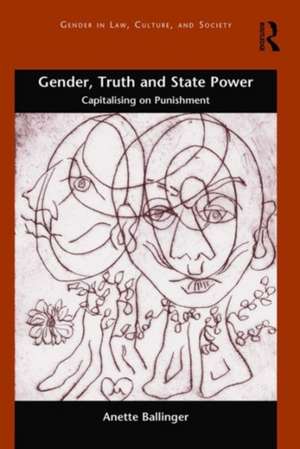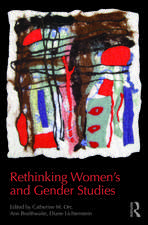Gender, Truth and State Power: Capitalising on Punishment: Gender in Law, Culture, and Society
Autor Anette Ballingeren Limba Engleză Hardback – 12 iul 2016
Using the key themes of truth, gender and power, the book also focuses on agency and rationality in relation to female criminality, masculinity and miscarriages of justice. Challenging official discourse which historically has incorporated entrenched constructions of women who kill as mad, bad or tragic victims, this book argues for the creation of new subject positions and alternative discourses within which female violence can be understood.
| Toate formatele și edițiile | Preț | Express |
|---|---|---|
| Paperback (1) | 383.13 lei 6-8 săpt. | |
| Taylor & Francis – 14 aug 2020 | 383.13 lei 6-8 săpt. | |
| Hardback (1) | 1033.06 lei 6-8 săpt. | |
| Taylor & Francis – 12 iul 2016 | 1033.06 lei 6-8 săpt. |
Preț: 1033.06 lei
Preț vechi: 1259.83 lei
-18% Nou
Puncte Express: 1550
Preț estimativ în valută:
197.80€ • 205.97$ • 164.11£
197.80€ • 205.97$ • 164.11£
Carte tipărită la comandă
Livrare economică 12-26 februarie
Preluare comenzi: 021 569.72.76
Specificații
ISBN-13: 9780754674788
ISBN-10: 0754674789
Pagini: 150
Dimensiuni: 156 x 234 x 15 mm
Greutate: 0.34 kg
Ediția:1
Editura: Taylor & Francis
Colecția Routledge
Seria Gender in Law, Culture, and Society
Locul publicării:Oxford, United Kingdom
ISBN-10: 0754674789
Pagini: 150
Dimensiuni: 156 x 234 x 15 mm
Greutate: 0.34 kg
Ediția:1
Editura: Taylor & Francis
Colecția Routledge
Seria Gender in Law, Culture, and Society
Locul publicării:Oxford, United Kingdom
Notă biografică
Dr Anette Ballinger is a lecturer in Criminology in the School of Social Science and Public Policy, Keele University. This study builds on her previous book Dead Woman Walking, winner of the Hart Socio-Legal book prize, 2001.
Cuprins
1 Introduction 2 Feminist Epistemologies and the Construction of Alternative Truths 3 Subjugated Knowledge, State Power and the Annihilation of Condemned Women: The Case of Louie Calvert 4 Infanticide and Child Murder: The ‘Leniency versus Harshness’ Debate Re-Visited 5 A Muted Voice from the Past: The Appeal of Ruth Ellis, 2003, 6 A Victory for Injustice: Truth, Lies and Expert Knowledge – the Sally Clark Case 7 Conclusion
Recenzii
'Anette Ballinger has a reputation for meticulously theorized, yet accessible, feminist archival research. This welcome sequel to her award-winning book, Dead Woman Walking, demonstrates the dynamic nature of knowledge production and the continuing need to challenge the established social order in the treatment of women charged with murder.'
Anne Worrall, Emerita Professor of Criminology, Keele University
'Combining theoretical and methodological sophistication with empirical rigour, Ballinger’s excavations into the convictions of women for murder – from the early 19th C to that of Sally Clark in 1999 - reveal much about the gender of law and the state and, in her superb transgressions of disciplinary boundaries, about the wider heteropatriarchal social order.'
Steve Tombs, Professor of Criminology, The Open University
'Anette Ballinger’s new book is an eloquent testimony to the power of careful historical excavation to shed light on the dynamics of the present. By airing voices suppressed in powerful practices such as law, it shows us that law’s claims to truth are constructed from particular points of view, and can be deconstructed and revised.'
Nicola Lacey, School Professor of Law, Gender and Social Policy, London School of Economics
Anne Worrall, Emerita Professor of Criminology, Keele University
'Combining theoretical and methodological sophistication with empirical rigour, Ballinger’s excavations into the convictions of women for murder – from the early 19th C to that of Sally Clark in 1999 - reveal much about the gender of law and the state and, in her superb transgressions of disciplinary boundaries, about the wider heteropatriarchal social order.'
Steve Tombs, Professor of Criminology, The Open University
'Anette Ballinger’s new book is an eloquent testimony to the power of careful historical excavation to shed light on the dynamics of the present. By airing voices suppressed in powerful practices such as law, it shows us that law’s claims to truth are constructed from particular points of view, and can be deconstructed and revised.'
Nicola Lacey, School Professor of Law, Gender and Social Policy, London School of Economics
Descriere
This volume draws on a wealth of primary source material, the vast majority of which has never been published before, to present a study of women reprieved of murder during the 20th Century. The work highlights the power difference between the condemned and those working within the criminal justice system. This comprehensive examination of such power differences in capital cases during the first half of the 20th century provides an important history to such modern cases.





























